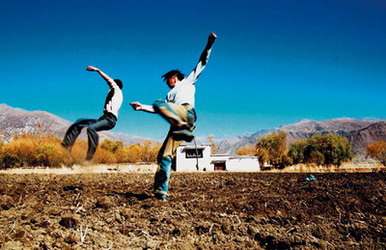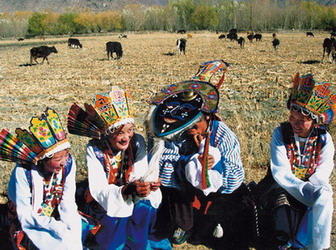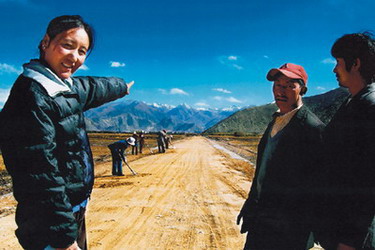The Shoton (Sour Milk Drinking) Festival is one of the indispensable festivals for the Tibetans. When I reached Lhasa, however, it was already "something that had happened in the past." My friends told me, the festival featured Tibetan opera performance in the Norbu Lingka, and monks and lay people were immersed in a world of art and happy celebrations. They also told me Tibetan opera was called Lhamo in Tibetan, meaning fairy maid.
With the assistance of Lhasa Mass Art Palace director Dawa, I recently set out to explore the secrets of Lhamo. It was actually only a short trip to Gyiari Village in Neqoin Town of Doilungdeqen County, some 30 km from Lhasa.

According to Dawa, Tibetan opera is performed throughout Tibet, but especially in Lhasa, Xigaze and Shannan. There, almost all large monasteries, villages and towns have their own performing troupes. In the one district and seven counties, there are 10 such troupes. One of these is the Jormolong Tibetan Opera Troupe of Gyiari Village, which boasts a long history.
Late autumn comes to the Qinghai-Tibet Plateau in November. This is the season for local farmers to do "nothing".
Dawa said "The players of folk theatrical troupes work in fields in busy farming season, give performance on stage during festivals, and study and rehearse in slack season of farming."
When we arrived at Gyiari Village, we saw in distance a group of people dancing and singing with the beating gongs and drums echoing across the flatlands.
Qoinda, 39, was the head of the Jormolong Tibetan Opera Troupe and she speaks proudly of it.
"The wall on the eastern side of the hall of the Norbu Lingka was also painted with the mural paintings of Jormolong Tibetan opera," she said.
"Gyiari Village, named Jormolong in olden times, was where Tangsang and her husband Lhugo lived. Tangsang was the student of Tangdong Gyibo, founder of Tibetan opera. At that time, Lhugo beat the drum and Tangsang performed, and local villagers loved them very much. Later, more and more people joined their performance, and the Jormolong Tibetan Opera Troupe came into being. This troupe got fine reputation for its good performance of Zholwa Sangmo, Beima Wenba and Sogyi Nyima among the eight great Tibetan operas. "On various grand festivals, especially the Shoton (Sour Milk Drinking) Festival, the old Tibet local government would order the Jormolong Tibetan Opera Troupe to give the main performance in the Zhaibung Monastery and Norbu Lingka."
Dawa and Qoinda also told me that Tibetan opera originated from the white facial mask performances from the time when there were no written records.

"Among mural paintings in the Samye Monastery constructed in the 8th century, there were three pictures about the performance of white facial mask opera identical with the starting ritual performance of the present white facial mask opera."
By the 14th century, Tangdong Gyibo, an eminent monk with the Shiangba Gagyu Sect of Tibetan Buddhism, made up his mind to set up iron chain bridge above every river in Tibet. To raise money, Tangdong Gyibo organized performances. With the arrival of seven girls who were good at singing and dancing from Shannan, Tangdong Gyibo designed the programs by absorbing all the dramatic factors from folk art and religion. He designed the music for voices and acts in opera, improved the accompaniment, and created blue facial mask opera on basis of the white facial mask Tibetan opera for raising enough money to build the bridges. The seven girls were pretty and bright, their dancing was graceful and elegant, and their voices were sweet and attractive. All the audiences hailed them as fairies from heaven. In Tibetan fairy is called as "Lhamo", and Tibetan opera is called the same.
Qoinda said that only eight dramas of Tibetan opera were frequently performed on stage and according to tradition Jormolong only performed three Zholwa Sangmo, Beima Wenba and Sogyi Nyima. Everyone is very familiar with the actions and words on stage, but the performing method and the way of appreciating Tibetan opera is very different from other operas. A complete drama of Tibetan opera can be performed for three or four days continuously, or even a week, but it can also be compressed into only two or three hours. Performers will insert some dramas that have nothing to do with the plot according to current circumstances to stimulate audience sentiment. To attract audiences, rehearsal is very important and Qoinda asked all the performers to wear dramatic clothes.
Dawa explained "Tibetan opera is generally performed in daytime, and lights and complex settings are not necessary. Only at formal performances is a sutra streamer pole, on top of which hangs Tangdong Gyibo's figure, will be set up before the stage." Only very few seniors watched the performance. We asked one old man, "Do you like watching Tibetan opera"

"Yes, I like it."
"Why don't young men come to watch"
"The youth have to work hard to earn money."
"Do they also like to watch Tibetan opera"
"Yes, they do. But they cannot understand it. They prefer watching TV and singing and dancing."
As they have signed performance contract with Norbu Lingka, Jormolong Tibetan Opera Troupe was in the best condition last year. Qoinda told us that, besides the income of 50,000 Yuan got from the performances in Norbu Lingka, the troupe earns more than 20,000 Yuan from other performances on traditional festivals.
"Costume is another important part of Tibetan opera. Different dramas need different costumes. Last year, we invested close to 60,000 Yuan alone on costumes."
Performers get a very low salary. Qoinda said "For each day of performing, every performer can only get 20 Yuan. But today even an unskilled laborer can earn above 35 Yuan by doing chores on construction sites. The Tibetan opera troupe that was reorganized not long ago will collapse again."
Actually, Jormolong Tibetan Opera Troupe experienced many collapses. Because of various reasons, in 1959, it broke off its performance for the first time since its foundation, before resuming between 1961 and 1965. From 1966 to 1971, they were idle again. In 1971, encouraged by the government, Jormolong Tibetan Opera Troupe reorganized. "But, later, all the members were busy in developing the economy and earning money, so they left one by one, and in 1984 the troupe folded. In 2002, Qoinda, who loved Tibetan opera performances since childhood, reorganized the troupe. Dawa told us frankly that many folk Tibetan opera troupes have the same experience due to financial issues.
As a matter of fact, there is really no need for Qoinda to worry about this. "In fact, we joined the Tibetan opera troupe not for money. Jormolong Tibetan Opera Troupe has 23 performers at present, and most of them are young people. Most of them view performing Tibetan opera as a pursuit of spiritual satisfaction apart from work."
Dorje, 70, said he had performed Tibetan opera for more than 40 years. Now, since the troupe was reorganized, as a veteran performer, he should give guidance to youth so as to carry forward the traditions of Tibetan opera. How can Tibetans live without Tibetan opera !
In addition, disregarding his age, Dorje took the role of the leading white facial mask opera character. Qamba, 66, was equally enthusiastic. At every rehearsal, he would go to the spot to direct the performance.
At noon, when the rehearsal ended, Qoinda invited us warmly to her family. Some performers who live far away came with us.

The house of Qoinda was like those of other locals, being a typical Tibetan single-story house. The living room with floor bricks looked very broad and bright. Besides the standing poles adored with characteristic ethnic pictures and Tibetan closets standing against the wall, the color TV sets, refrigerator, recorder, and sofa, etc created a modern atmosphere.
Qoinda family has 0.9 hectare of contracted land that they mainly plant with barley, wheat, corn and potato. Every year, they can earn 7,000 Yuan from the land. A son is studying the painting mural pictures in the Jokhang Monastery and he gets a payment of 750 Yuan every month. A daughter is studying in the second grade in the local junior school, and her tuition fees for each semester are only 95 Yuan. The major income of the Qoinda family depends on her husband who breaks stones on the mountain in the slack season of farming and can earn 20,000-30,000 Yuan every year.
Qoinda once raised pigs and could earn much every year. But since taking the role of leader of the Tibetan opera troupe, she had no more energy for this. Now, she only has two pigs. Qoinda said "We raise pigs as our own food", "Besides breaking stones on the mountain, many people of our village went to Lhasa to work or do business. Among nearly 400 households in the village, the condition of our family is only medium". At the same time, Dawa said that Neqoin Town is a comparatively rich town in the suburban area of Lhasa, and "because most families are rich, Jormolong Tibetan Opera Troupe can be reorganized. Furthermore, performers do not care about payment and have enthusiasm."
Soinam Dainzin, Qoinda's husband, is an unpretentious and silent Tibetan man. At seeing us come, he hurried to cook a big bowl of beef braised with potatoes. As I was the only Han among them, Soinam Dainzin asked me, "Do you drink tea or buttered tea" I answered, "Buttered tea". When seeing me drink a big mouthful, he asked again, "Is it suitable for you" I said, "It is delicious." Maybe it was this bowl of fragrant buttered tea that reduced the distance between us.
Soinam Dainzin said "There is no income by operating Tibetan opera, but as she likes it, she can do it. In fact, doing a favored thing is real happiness."
The Qinghai-Tibet Railway is under construction is not far away. Qoinda said she hoped the railway could be constructed soon, and then she can lead her Tibetan opera troupe to faraway places to perform.
With Dawa's introduction, I went to see Nyiangra Township folk amateur art troupe 3 km from the center of Lhasa city. Completely different from the condition of Jormolong Tibetan Opera Troupe, this troupe not only has their own large rehearsal hall and offices, but also has a cattle farm, a cement prefabricating factory and a sand field. The fixed assets of the troupe total 4.5 million Yuan, and the performers can get an income of over 6,500 Yuan on average every year and even of 10,000 Yuan at most.
Upon seeing me, the leader of the troupe led me to the rehearsal hall where the performers were practicing with dulcimer, six-stringed instrument, trumpet, horn, drum, flute, etc. Gelung explained that there were 69 performers of Tibetan opera, dancing and singing.
Nyiangra Township folk amateur art troupe was established in 1979 and was once close to financial collapse. But they struggled on and gradually became one of the well-known folk Tibetan opera troupes in Lhasa.
"Now we can perform five classics including Zholwa Sangmo, Beima Wenba, Chimei Gendun, Sogyi Nyima and Prince Norsang. Among them, Beima Wenba, performed by us, was filmed and screened abroad."
Gelung said "Tibetan audiences love the original and natural features of Tibetan opera, Tourists coming from the hinterland love Tibetan music and music, and foreigners appreciate the masks and costumes. As a result, we adjust the dramas according to different audiences, and they all like it".
This art troupe not only gives performance in villages nearby, but also performs for domestic and foreign tourists in hotels in Lhasa. In addition, they are often invited to perform in Xigaze, Shannan, Nyingchi and other regions. Now, the art troupe gives performance for three times every day on average. Last year, this troupe earned performing income of more than 600,000 Yuan.
It was reported that, in order to spread Tibetan opera to later generations with original features, the relevant departments of Tibetan government have applied for Tibetan opera be recognized by UNESCO as "Human Oral and Non-material Relics Representative Work".
